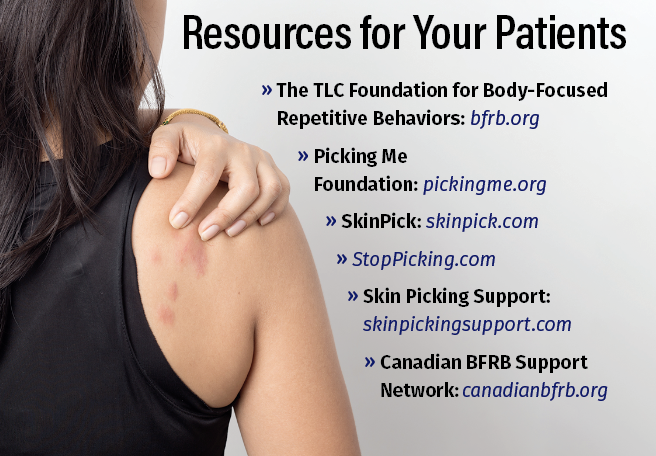- Case-Based Roundtable
- General Dermatology
- Eczema
- Chronic Hand Eczema
- Alopecia
- Aesthetics
- Vitiligo
- COVID-19
- Actinic Keratosis
- Precision Medicine and Biologics
- Rare Disease
- Wound Care
- Rosacea
- Psoriasis
- Psoriatic Arthritis
- Atopic Dermatitis
- Melasma
- NP and PA
- Skin Cancer
- Hidradenitis Suppurativa
- Drug Watch
- Pigmentary Disorders
- Acne
- Pediatric Dermatology
- Practice Management
- Prurigo Nodularis
- Buy-and-Bill
Publication
Article
Dermatology Times
Psychodermatology: Exploring the Connections Between Dermatology and Psychiatry in Dermatillomania
Author(s):
Last week was Body-Focused Repetitive Behaviors Awareness Week. Related to dermatology, dermatillomania, also known as skin picking disorder, is a condition that requires empathy and understanding year round.
It is estimated that upwards of 85% of dermatology patients report detrimental psychosocial impacts, noting that the psychological effects of their condition are a major component of their lives. It is well documented that mental health and well-being issues can accompany dermatologic conditions as a comorbidity or adverse effect.1
But what about conditions related to skin health that are attributable to the mind-skin connection? Or conditions that overlap fields of medicine, such as dermatology and psychiatry? Of these, “dermatillomania” (also known as excoriation disorder or skin-picking disorder) overlaps both specialties, with a lack of awareness among dermatology providers. According to the Picking Me Foundation, approximately 9 of 10 dermatologists are either unaware of the condition or how to treat it appropriately.2
This October, Dermatology Times is shedding light on the little-understood condition, as recognition for dermatillomania advocacy and awareness takes place each year from October 1 to 7 with Body-Focused Repetitive Behaviors (BFRB) Awareness Week.

What to Know About Recognizing Dermatillomania
Dermatillomania is a mental illness involving repeated picking of the skin, which can lead to broken skin, open wounds, scabs, swelling, and infection. It is associated with obsessive-compulsive tendencies and is estimated to affect anywhere between 1.4% and 5.4% of adults in the United States, with greater prevalence among women.3 Typically beginning in adolescence, dermatillomania has no determined cause, but research has suggested that genetics, changes in brain structure, and psychiatric conditions such as stress and anxiety, as well as anxiety-related factors, may play a significant role.3
Addressing Stigma, Misconceptions, and Quality of Life
Because dermatillomania is known by several different names, including neurotic picking, psychogenic excoriation, compulsive/chronic skin picking, pathologic skin picking, and acne excoriée, knowledge and awareness of the condition can be easily confused and limited. This can contribute to the significant stigma4 surrounding the condition and those affected by it.
According to researchers, stigma and misconceptions can take many forms. Stigma may be associated with visible differences when compared with the wider culture and perceived sense of pathogen/communicable disease status of those with the condition, among others.4
One preliminary study5 of individuals with dermatillomania and another BFRB, trichotillomania (a disorder involving repeated and compulsive hair pulling,) explored the relationship between the conditions and individual temperament. When compared with healthy controls, patients with dermatillomania had lower average Quality of Life Index scores. Tridimensional Personality Questionnaire scores were higher among those with dermatillomania in the areas of harm avoidance, anticipatory worry, fear of uncertainty, shyness with strangers, and fatigability than otherwise healthy individuals. Another study6 found that individuals with dermatillomania generally have strong appearance-related concerns regardless of simultaneous dermatologic conditions; additionally, the study discussed the negative impact of dermatillomania on body image, dysmorphic concerns, and mental health.
The Future of Collaborative BFRB Treatment
Recent research has pointed toward a brighter future for patients with dermatillomania. While no specific medication has been FDA-approved to assist patients with the condition, a study published earlier this year6 found that memantine, a drug commonly used to treat patients with Alzheimer disease, effectively reduced symptoms in patients with dermatillomania.
It is imperative, however, for dermatologists to recognize the pivotal role they play in the treatment of patients with dermatillomania and to embrace the nature of the collaborative psychiatric treatment the condition requires. “Dermatologists are uniquely placed to guide patients lacking knowledge about BFRBs and experiencing stigma, shame, and isolation,” wrote authors Madan et al in a study published in Clinical Dermatology.7 “We suggest using curiosity and compassion as they diagnose and educate their patients about BFRBs, recognizing the degree of shame that most BFRB sufferers report.”
References
- Marshall C, Taylor R, Bewley A. Psychodermatology in clinical practice: main principles. Acta Derm Venereol. 2016;96(217):30-34. doi:10.2340/00015555-2370
- Selecting dermatologists. Picking Me Foundation. July 17, 2018. Accessed September 11, 2023. https://pickingme.org/blog/blog.html/article/2018/07/17/selecting-dermatologists.
- Excoriation disorder (skin picking or dermatillomania). Mental Health America. Accessed September 11, 2023. https://mhanational.org/conditions/excoriation-disorder-skin-picking-or-dermatillomania.
- Anderson S, Clarke V, Thomas Z. The problem with picking: permittance, escape and shame in problematic skin picking. Psychol Psychother. 2023;96(1):83-100. doi:10.1111/papt.12427
- Schmidt J, Gallinat C, Martin A. Appearance-related concerns in individuals with pathological skin picking—a comparison with individuals with dermatological conditions and skin-healthy controls. Front Med (Lausanne). 2023;10:1075743. doi:10.3389/fmed.2023.1075743
- Dungey D. New research points to drug option for hair-pulling, skin-picking disorders. University of Chicago Medicine. March 6, 2023. Accessed September 11, 2023. https://www.uchicagomedicine.org/forefront/research-and-discoveries-articles/new-research-points-to-drug-option-for-hair-pulling-skin-picking-disorders
- Madan SK, Davidson J, Gong H. Addressing body-focused repetitive behaviors in the dermatology practice. Clin Dermatol. 2023;41(1):49-55. doi:10.1016/j.clindermatol.2023.03.004







